Will Eisner: Champion of the Graphic Novel
Mar 04, 2016
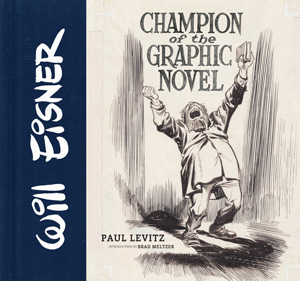 From the days of the Eisner-Iger Studio to the adventures of The Spirit, and from A Contract with God to The Name of the Game, Will Eisner’s name became practically synonymous with pushing the comic art form for everything it was worth. In Will Eisner: Champion of the Graphic Novel (SEP150893), former DC Comics president and publisher – and noted historian – Paul Levitz celebrates Eisner and his legacy. The book traces this master craftsman’s evolution as an artist, showcases rare and unpublished materials, and analyzes his impact on the art form. The Overstreet Comic Book Price Guide’s J.C. Vaughn talked with Levitz about this new book.
From the days of the Eisner-Iger Studio to the adventures of The Spirit, and from A Contract with God to The Name of the Game, Will Eisner’s name became practically synonymous with pushing the comic art form for everything it was worth. In Will Eisner: Champion of the Graphic Novel (SEP150893), former DC Comics president and publisher – and noted historian – Paul Levitz celebrates Eisner and his legacy. The book traces this master craftsman’s evolution as an artist, showcases rare and unpublished materials, and analyzes his impact on the art form. The Overstreet Comic Book Price Guide’s J.C. Vaughn talked with Levitz about this new book.
Will Eisner: Champion of the Graphic Novel (SEP150893) is now available in stores.
**********
PREVIEWSworld: What are things that continue to make Will Eisner such a compelling figure in the history of American comics?
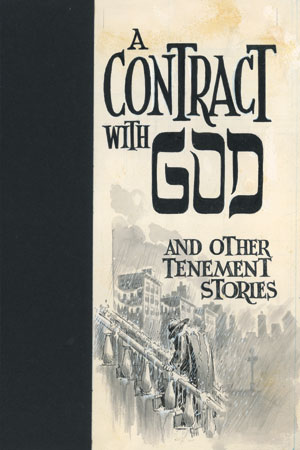 Paul Levitz: There are several dimensions to Will's continuing impact on American comics: our major creative figures of the past three decades were inspired by his work, particularly with A Contract With God, and his students and friendly “disciples” continue to dominate the comics marketplace; many of the techniques Will helped introduce to comics in the 1940s in The Spirit have become part of the language of comics; and Will's theorizing about what he called sequential art has been built upon by Scott McCloud and others, but remains crucial to our theoretical language for the medium. And the continuing importance of the Eisner Awards serves as a good reminder of his stature.
Paul Levitz: There are several dimensions to Will's continuing impact on American comics: our major creative figures of the past three decades were inspired by his work, particularly with A Contract With God, and his students and friendly “disciples” continue to dominate the comics marketplace; many of the techniques Will helped introduce to comics in the 1940s in The Spirit have become part of the language of comics; and Will's theorizing about what he called sequential art has been built upon by Scott McCloud and others, but remains crucial to our theoretical language for the medium. And the continuing importance of the Eisner Awards serves as a good reminder of his stature.
PREVIEWSworld: Eisner and his work have been the subjects of books, documentaries, and many, many articles. What differentiates your new book for the other efforts out there?
Paul Levitz: Will talked about his life and theories far more than any of his contemporaries, too. It's why I didn't try to do a biography. Will Eisner: Champion Of The Graphic Novel is an attempt to explain his lifelong quests, and to evaluate why he's been so important to the growth of the graphic novel as a significant new art form in America. Will lived a very unusual life for a cartoonist, and piecing those threads together matters.
There's been a lot written academically about the evolution of the graphic novel, but I think this book makes a new case for what happened in America in the late '70s and mid-'80s, and why. It gives proper due to the immediate progenitors of the modern graphic novel, unearths a few factoids that people aren't aware of, and hopefully puts it all into context.
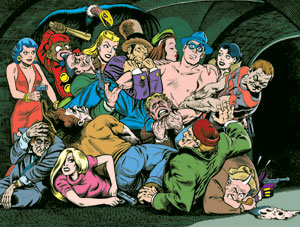 Plus it's lavishly illustrated with Will's artwork, including never-before-seen pieces, and rarely-seen pieces, many reproduced from the original artwork.
Plus it's lavishly illustrated with Will's artwork, including never-before-seen pieces, and rarely-seen pieces, many reproduced from the original artwork.
PREVIEWSworld: What was your first exposure to his work?
Paul Levitz: I first saw Will's work in The Great Comic Book Heroes, and got small tastes of it in my early years in fandom. Mark Hanerfeld, who has a small but fascinatingly significant moment in the new book, first really introduced me to Will's work on The Spirit, and sold me a stack of the original sections.
PREVIEWSworld: What were the circumstances when you interviewed him for the first time?
Paul Levitz: I met Will when I was doing The Comic Reader, an early newszine for the comics field. He was launching the Warren magazine series of The Spirit. At 15 or 16 I didn't have the right perspective to understand the treasure trove of history in his mind, but it was the beginning of a long relationship that blossomed into friendship.
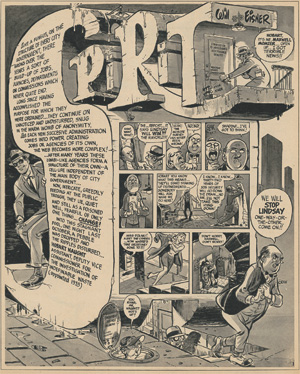 PREVIEWSworld: From interviewing him as a young fan to publishing The Spirit Archives at DC, that’s a journey that would seem to afford a lot of perspective on your subject. What insight do you think you gained by viewing and eventually knowing Eisner over that long a period?
PREVIEWSworld: From interviewing him as a young fan to publishing The Spirit Archives at DC, that’s a journey that would seem to afford a lot of perspective on your subject. What insight do you think you gained by viewing and eventually knowing Eisner over that long a period?
Paul Levitz: I do suspect I saw more sides of Will than most people of my generation: dealing with him as his publisher, negotiating with him, and seeing his priorities and concerns in person. And the fact that I shared a great deal of background with him (both as children of immigrant Jewish families in New York, though in different times and economies) added important perspective too.
I also realized, while talking with Jules Feiffer for the book, that we knew many of the same people when we were each young--Will and Jules at the beginning of many of these folks' careers, me towards the end of theirs. I worked with so many of their collaborators: Nick Cardy, Jerry Grandinetti, Bill Draut, Bill Woolfolk, Joe Kubert, Wally Wood, Jack kirby--the list goes on. Some of them had shared their opinions of Will with me over the years, and that shaped my writing as well.
And of course I lived the journey of the graphic novel to its current position, as a fan (my signed and numbered first edition of Contract as testimony), as the publisher of some of the important works that finally made the form “break through” to respectability and commercial success, and as a businessman trying to solve the problems that had blocked the form for many years.
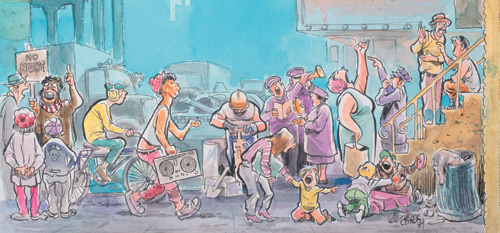 |
PREVIEWSworld: What made now the time to do this book?
Paul Levitz: Well, I started on it as soon as I left my desk job and had the freedom to do serious writing. In an era when Fun Home can be a Tony Award-winning play on Broadway, when comics material is saturating our mass culture, and when legendary great cartoonists from Feiffer to Roz Chast to newly-great cartoonist like Raina Telegemeir can be producing graphic novels, it's certainly a good moment to try to explain how we got here. This is an important piece of the story.
PREVIEWSworld: The graphic novel didn’t spring fully formed from the brow of Will Eisner, but yet the title of your book makes absolute sense to so many in the industry. What made him into that man?
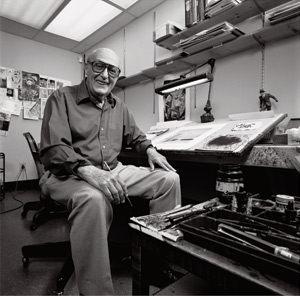 Paul Levitz: My thesis is, ultimately, that Will spent his life in search of respect: respect for himself as an individual, and for the medium that he loved and worked in. If he was going to do comics, he wanted America to recognize it as an art form, as so many other countries already had.
Paul Levitz: My thesis is, ultimately, that Will spent his life in search of respect: respect for himself as an individual, and for the medium that he loved and worked in. If he was going to do comics, he wanted America to recognize it as an art form, as so many other countries already had.
He also was uniquely suited for the task, as a ground-breaking creator who continue to create and strive literally until the day his final hospitalization began, as a business leader both of the creative and publishing community, and as a warm person who could stand up in public as the champion of the work he loved.
PREVIEWSworld: How important is understanding the context in which he worked to understanding his achievements and impact on the modern success of the graphic novel?
Paul Levitz: History can only be told in the context of its time. A book like this doesn't have room to take in the whole of comics' history (which Will had a major role in for decades), but hopefully I've been able to interject enough context that things which might have seemed spontaneous (like the birth of The Spirit sections) can now be connected to the events that may have triggered them.
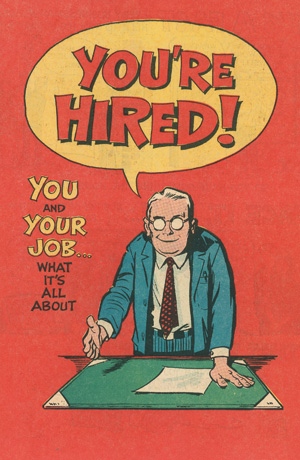 PREVIEWSworld: In your preface, you wrote, “Eisner’s artistic peers were notoriously poor at managing their business activities and primarily served as cautionary tales in how not to be well rewarded for creative triumphs.” It’s no secret that many creative folks, even some very successful ones, have not managed their finances well. What do you think made Eisner a good businessman?
PREVIEWSworld: In your preface, you wrote, “Eisner’s artistic peers were notoriously poor at managing their business activities and primarily served as cautionary tales in how not to be well rewarded for creative triumphs.” It’s no secret that many creative folks, even some very successful ones, have not managed their finances well. What do you think made Eisner a good businessman?
Paul Levitz: At a start, making money mattered to Will. Many of his cartoonist peers really only wanted to do their art; if it provided enough money for their families to live reasonably, that was a success in the post-Depression years. In order to make profits consistently in any business activity, you have to aspire to profitability and growth, and Will did. Sometimes this came out as appearing cheap to his collaborators, but it enabled his businesses to thrive and survive.
Will also had good horse-sense as a negotiator. He was happy when everyone felt they had won in a deal. That's a good attitude for long-term success.
PREVIEWSworld: In talking about earning a living from his work as a motivating factor, early in his career, was he aware that in the darkest days of the Great Depression there were more than a few millionaires created by the successful comic strips of the day? And if so, what impact do you think that had on him?
Paul Levitz: I have to assume he knew there were rich cartoonists on the strips--I think they were public figures, and given his interest in the field, he'd have heard. Certainly he knew that by the time The Spirit was born. But I think the attraction was even greater from the fact that the newspaper strip guys were respected in a way comic book talents were not.
PREVIEWSworld: For all his business acumen, he was also an amazing creative force. What do you think were his biggest strengths as a cartoonist?
 |
Paul Levitz: I think his curiosity may have been his greatest strength – Jules talked about all the reading and viewing influences that Will brought to his work, Denis Kitchen talked about how Will was fascinated by what artists were doing in the underground comix of the '60s and early '70s. He grew as an artist by being interested in the world around him, and stretching to try to stay with it or ahead of it.
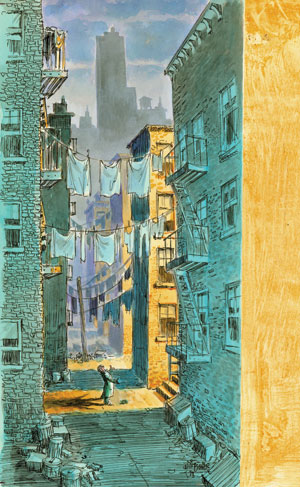 PREVIEWSworld: What do you think made him able to put the business and creative sides together so well?
PREVIEWSworld: What do you think made him able to put the business and creative sides together so well?
Paul Levitz: That may be a question for a psychologist, or perhaps for an autopsy. Normally the creative and business sides of the brain don't work that harmoniously, yet in Will they did. Part of it was the balance between his parents' influences, as his biographers have remarked, with his mother wanting him to have a secure job and his father pushing for him to pursue his art. But ultimately, I think his mind was simply wired to be able to do both.
PREVIEWSworld: In the process of researching this book, what surprised you about your subject?
Paul Levitz: That there was a complete, clear through line that could be built for a life that included stages as an artist, businessman, teacher, and artist again.
PREVIEWSworld: With his body of work, what do you think he achieved?
Paul Levitz: He became one of the three or four most important artists in the development of the language of comics in America, and arguably the most important advocate for the literary and artistic worthiness of the form. Along the way, he told some lovely stories. Not a bad life's work.
PREVIEWSworld: Later in his career, when he had returned to doing graphic novels, did he have a sense of how many people he had inspired? If so, what did he think about it?
Paul Levitz: By the time the Eisner Awards started, I think so many who followed in his path had told him that he knew. I recall writing a piece for his 80th birthday, I think it was (so 1997), and the list of folks contributing to that chapbook was pretty awesome.
I think Will was proud of what his work had meant to people, and excited by what those people had done. But it was a quiet, glowing pride. Very fatherly.
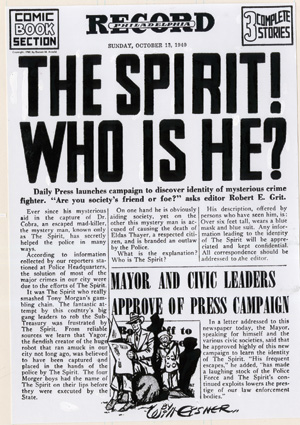 PREVIEWSworld: Of his works, what’s your personal favorite?
PREVIEWSworld: Of his works, what’s your personal favorite?
Paul Levitz: Like Will, the "Gerhard Schnobble" episode of The Spirit is my favorite. In writing the book, however, my understanding of it changed greatly. I'm now convinced that consciously or not, Will made it as a metaphor for his own frustration: like Gerhard, he flew (artistically), and the world hadn't noticed. But they would, decades later.
PREVIEWSworld: In many of his graphic novels, New York City was as much a character as a setting. Could Will Eisner have been the Will Eisner we knew or experienced without New York?
Paul Levitz: Speaking as a lifelong New Yorker, not a chance.
PREVIEWSworld: Anything else you’d like to add?
Paul Levitz: There are lessons we can all take from how Will lived, and from what he accomplished for our medium. I hope I've presented his life and its effects in a way that will help others remember him, and take comics to the next levels.




